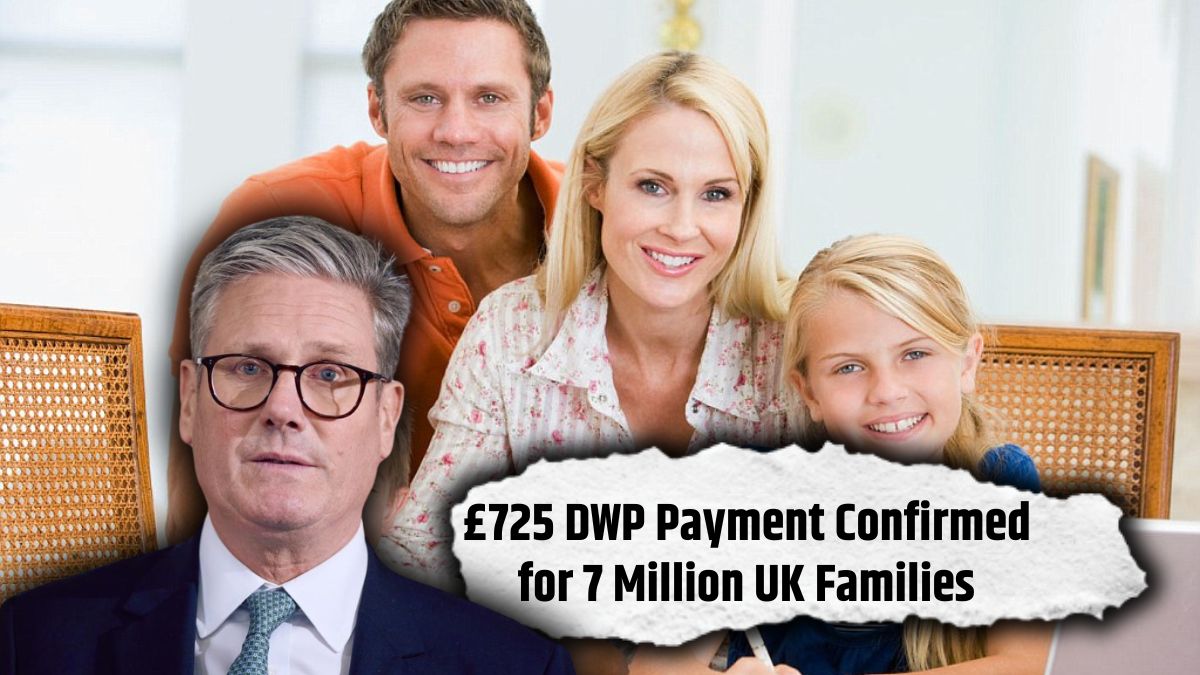The UK government has announced a new relief scheme, under which about 70 lakh (7 million) households will be provided financial assistance of £725. The scheme will be implemented by the DWP (Department for Work and Pensions) in 2025 and has been introduced as part of the Welfare Reform Bill.
£725 Payment for Millions in 2025
As inflation continues to rise and the cost of living escalates across the UK, the government has introduced a major support measure: a one-time £725 payment for nearly 7 million low-income households. This initiative, launched by the Department for Work and Pensions (DWP) under the Welfare Reform Bill, is set to offer timely financial assistance to families already relying on public benefits.
The payment will begin distribution in July 2025, without requiring any additional application process for eligible recipients.
What Is the Welfare Reform Bill and Why Is It Important?
The Welfare Reform Bill 2025 is a significant legislative push to simplify and streamline the UK’s social security system. Its goal is to deliver faster, more direct support to economically vulnerable groups, especially those struggling with rising rent, energy bills, and food prices.
As part of this reform, the £725 lump sum will be issued to households currently receiving one or more of the following benefits:
- Universal Credit
- Pension Credit
- Income Support
- Employment and Support Allowance (ESA)
- Jobseeker’s Allowance (JSA)
- Working Tax Credit / Child Tax Credit
- Housing Benefit
Why This £725 Relief Is Being Offered
The UK is facing a period of economic strain, and many families are feeling the pinch. This £725 payout is meant to serve as immediate relief for households trying to meet basic needs amid:
- High utility and energy costs
- Escalating grocery and living expenses
- Increased rent and housing bills
While the amount may not solve long-term financial struggles, it aims to provide short-term breathing room for families most in need.
Who Is Eligible for the £725 Payment?
To receive the £725 relief, you must meet the core eligibility criteria set by the DWP:
- Legally residing in the UK
- Actively receiving one or more of the listed qualifying benefits
- Your household income must be within DWP-set thresholds
- Your benefit claim must be active by the payment eligibility date in 2025
Important note: Even if your household qualifies for multiple benefits, you will receive only one £725 payment, not multiple.
Payment Timeline: When Will You Get Paid?
The DWP will begin disbursing the £725 payments in stages starting July 2025. The rollout will follow a three-phase structure based on benefit type:
- Stage 1 – Recipients of Universal Credit
- Stage 2 – Claimants of Pension Credit, ESA, and JSA
- Stage 3 – Beneficiaries of Working/Child Tax Credits and Housing Benefit
Payment Method: How Will You Receive It?
The DWP has ensured a hassle-free process for distributing the funds:
- Payments will be made via direct bank deposit to the same account where you currently receive DWP or HMRC benefits
- Individuals without valid bank accounts will receive a paper cheque by post
To avoid delays, make sure your bank details and contact information are accurate and up to date with the DWP or HMRC.
No Application Needed: It’s Automatic
One of the scheme’s most convenient features is that no separate application is required.
If you meet the eligibility conditions and your benefit claim is active, the £725 will be paid automatically. However, here’s what you should do to ensure smooth processing:
- Update your bank account details if they’ve changed
- Respond promptly to any official communication from HMRC or DWP
- Make sure your benefit renewal is submitted and approved before the eligibility date
What If You Don’t Receive the Payment?
If you haven’t received the £725 payment by the end of July 2025, but believe you are eligible, here’s what to do:
- Contact the DWP or HMRC through official channels
- Log into your online benefits portal to check your payment status
- Complete a ‘Missing Payment’ form if instructed
- Visit your local Jobcentre Plus or benefits office if further assistance is needed
Why the £725 Payment Matters
This initiative goes beyond a simple one-time payment—it reflects the government’s commitment to protect vulnerable communities. For many households, this financial support can mean:
- Senior citizens covering medication and healthcare costs
- Parents affording school essentials and meals for their children
- Jobseekers bridging the gap while searching for stable employment
While some critics argue that £725 isn’t enough to address long-term economic challenges, supporters see it as a critical safety net for millions struggling in the current economy.
Public Reaction: Praise, Concerns, and Expectations
The announcement has sparked mixed reactions:
- Many view it as a welcome step in a difficult economic climate
- Others argue that the amount should have been higher or recurring
- Advocacy groups emphasize the need for ongoing structural reforms, not just one-time aid
Nevertheless, for 7 million households, this payment represents essential relief that can’t come soon enough.
FAQs
Q1. What is the £725 DWP payment announced in Welfare Reform 2025?
A. It is a one-time financial relief payment offered under the UK government’s Welfare Reform Bill to help low-income households tackle the rising cost of living.
Q2. Who will receive the £725 payment?
A. Approximately 7 million UK households receiving qualifying benefits such as Universal Credit, Pension Credit, ESA, JSA, Working/Child Tax Credits, or Housing Benefit.
Q3. Do I need to apply for the £725 payment?
A. No. If you’re receiving an eligible benefit and your claim is active, the payment will be automatically deposited into your account.
Q4. When will the £725 payment be made?
A. The payment rollout begins in July 2025, starting with Universal Credit recipients, followed by other benefit categories.
Q5. How will I receive the payment?
A. You’ll receive it via direct deposit into your existing DWP or HMRC benefit account, or by paper cheque if no bank details are on file.








